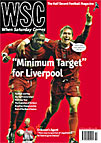 This is the time of year when the newspapers are filled with hopes for the coming year, with pleas for respect for referees, less diving and world peace. All very laudable but, really, we can’t be doing with any of it. There is only one thing we’ll ask for – that this year’s FA Cup isn’t won by one of the top three, or Liverpool. We’re even prepared to tolerate one of the curses of the modern age, tracking camera shots of whooping fans in jester hats and curly wigs, provided they are celebrating a victory for an underdog.
This is the time of year when the newspapers are filled with hopes for the coming year, with pleas for respect for referees, less diving and world peace. All very laudable but, really, we can’t be doing with any of it. There is only one thing we’ll ask for – that this year’s FA Cup isn’t won by one of the top three, or Liverpool. We’re even prepared to tolerate one of the curses of the modern age, tracking camera shots of whooping fans in jester hats and curly wigs, provided they are celebrating a victory for an underdog.
For years now England’s oldest domestic trophy has been said to be in decline, for reasons we’ve all heard, the most significant being the spread of Champions League places diminishing the “value” of winning and that the vast increase in televised football over the past decade means the Cup final has come to be seen as just another live game rather than a special occasion. For those who fear for the future of the competition, there were more negative signs in this season’s third round. Bolton and Charlton rested players for their ties, with disastrous consequences for the latter, and some attendances were poor – 15,000 at Middlesbrough v Notts County, under 12,000 at Nottingham Forest v West Brom, barely 10,000 for Fulham v Cheltenham.
This season Arsenal could be the first club since Blackburn in 1886 to win the trophy for three years in succession. It would be a remarkable achievement, even if the prospect doesn’t particularly excite Arsène Wenger, who was calling for cup ties to be played on Wednesdays rather than Saturdays two years ago.
That’s not to say that the bigger clubs don’t care. They field full-strength teams in the latter stages and have developed often venomous personal rivalries that would preclude their taking it easy in matches against one another. But their dominance is deathly and unprecedented. The pre-eminent league clubs in previous eras didn’t monopolise the Cup – it eluded the Arsenal team that won five league titles in seven seasons in the 1930s and it was famously the only trophy Bob Paisley didn’t win as Liverpool manager in among six championships and three League Cups, plus four European gongs.
The results of Cup finals before the past decade demonstrated time and again how mid-table teams were able to raise their game and prevail, producing some of the greatest finals in the process. Yet Spurs in 1991 and Everton in 1995 are the only teams outside the current big four to have won the FA Cup in the past 15 seasons. With the league title closed off to most supporters, they need the Cup to count for something more than an opportunity for their team to put up a “battling display” before bowing out to one of the big guns. The League Cup has always been over too early for most and we’ve all but given up remembering what it’s called each season, which doesn’t help.
The Football Association do at least seem aware, belatedly, that their flagship competition is in need of help. Stung by the outcry over Farnborough Town’s switching of their 2003 third round tie with Arsenal to Highbury, they now require all clubs entering the competition to provide a safety certificate to show that home ties can be held with their stated maximum capacity in place – sporting principles reasserted over the need to make a profit. They have also moved the draw back to Monday afternoons, ending the ludicrous situation in recent years where teams are kicking off on a Sunday live on one channel while another is showing who the winners will play next (though we would still like the clanking machine replaced by the old velvet bag).
Some would see the Cup final’s return to Wembley, possibly by 2006, as a positive step, too, though the fact that the final had to be shifted from its traditional venue can’t be offered a plausible excuse for the decline of the Cup – the Millennium Stadium is a hundredfold improvement on the hellhole that Wembley had become, inside and out.
But the FA need to do more, introduce a few stunts to liven things up. Why not have all matches played on specially watered pitches, if it helps upsets? Chelsea nearly went out at a sodden Vicarage Road. Players could be banned for life if, like Dennis Wise, they mistake the final for a day out at Alton Towers and bring their kid up to collect the trophy.
Of course the biggest thing the FA could do would take a deal of political will. While England have four Champions League spots, surely it is not outrageous to expect that more than one should be allocated on the basis of actually winning something? Mark Palios would have to persuade UEFA and the clubs, but a majority of the latter may be pliable as they would at a stroke increase their chances and add a real draw value to every Cup tie. No under-strength teams, then.
For now, as long as it’s not one of the big four who lift the Cup in May we don’t mind who wins it. Telford would be nice, but if that’s asking too much…
From WSC 204 February 2004. What was happening this month